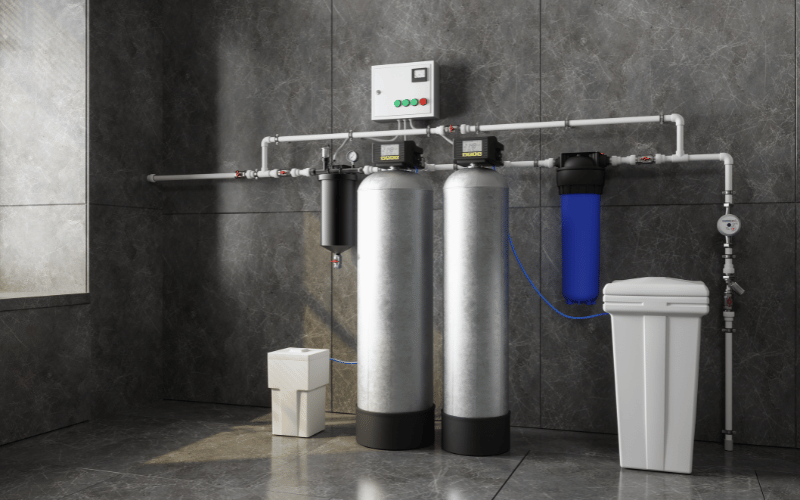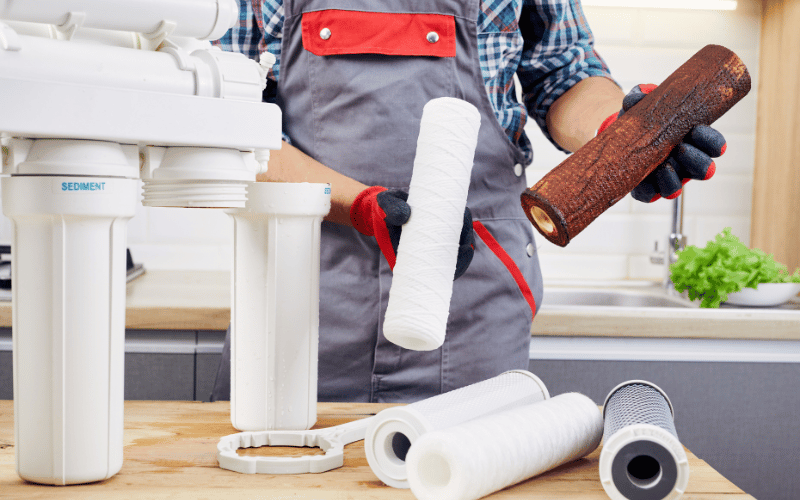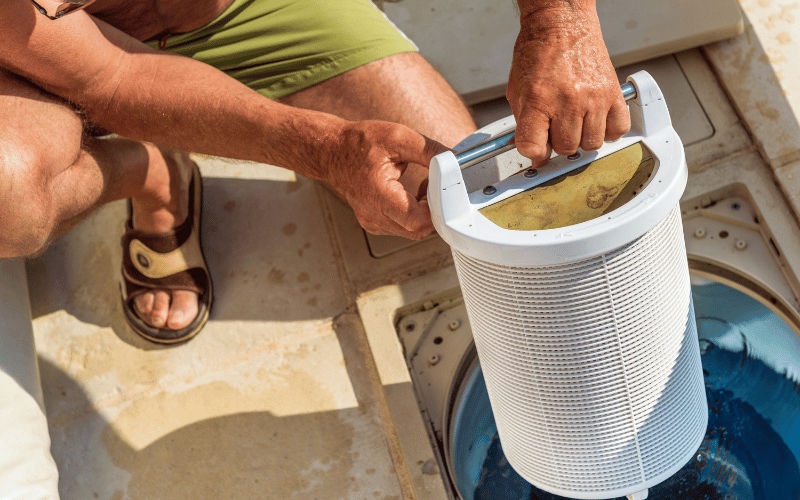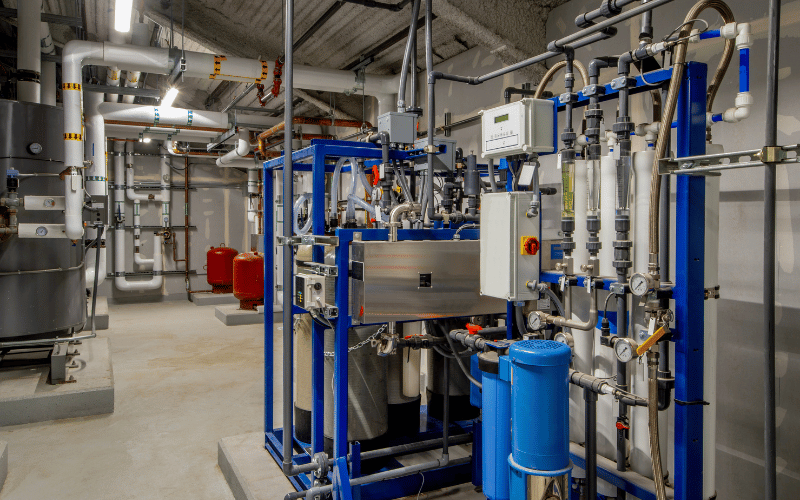Water filtration systems play a crucial role in ensuring the quality of water for both industrial operations and residential use. Industries rely on these systems to maintain efficient machinery, comply with regulatory standards, and deliver high-quality products. At home, they safeguard health by reducing contaminants, improving taste, and providing peace of mind. This article aims to offer a balanced perspective on the advantages and limitations of water filtration systems, while equipping readers with actionable insights to make informed decisions.
Table of Contents
ToggleWhat Are Water Filtration Systems?
Understanding Water Filtration Systems and Their Purpose
Water filtration systems are specialized technologies designed to remove impurities, contaminants, and unwanted particles from water, ensuring it is safe and suitable for various uses. These systems operate by employing physical barriers, chemical processes, or biological mechanisms to filter out harmful substances, including bacteria, viruses, heavy metals, sediments, and chemical pollutants. By doing so, they play a crucial role in enhancing water quality, safeguarding human health, and supporting industrial processes.
The primary function of water filtration systems is to address the diverse challenges posed by water contamination. Contaminants in water can range from visible particles, such as dirt and sand, to microscopic pathogens and dissolved chemicals that are invisible to the naked eye. Filtration systems are designed to target these impurities, ensuring that water meets specific safety and quality standards. This makes them indispensable in a world where access to clean water is increasingly vital.
Common Applications of Water Filtration Systems
Water filtration systems are widely used across various sectors, each with unique requirements and challenges. Below are some of the most common applications:
- Residential Use
In homes, water filtration systems are essential for providing clean and safe drinking water. They are often installed as under-sink units, countertop filters, or whole-house systems. These systems help remove chlorine, lead, pesticides, and other contaminants that can affect the taste, odor, and safety of tap water. Additionally, they protect household appliances by reducing scale buildup caused by hard water. - Industrial Applications
Industries rely heavily on water filtration systems to ensure the quality of water used in manufacturing processes. For example, in the pharmaceutical and electronics industries, ultra-pure water is crucial for preventing product contamination. Filtration systems in these settings often incorporate advanced technologies, such as reverse osmosis and deionization, to achieve the required levels of purity. - Food and Beverage Sector
The food and beverage industry uses water filtration systems to maintain hygiene and product quality. Clean water is crucial for washing raw materials, preparing beverages, and ensuring the safety of processed foods. Filtration systems help remove impurities that could alter the taste, appearance, or safety of the final product. - Agricultural Use
In agriculture, water filtration systems are employed to ensure that irrigation water is free from sediments and harmful microorganisms. This not only protects crops but also prevents the clogging of irrigation equipment, ensuring efficient water delivery. - Municipal Water Treatment
Municipalities utilize large-scale water filtration systems to provide communities with clean drinking water. These systems often involve multiple stages of filtration, including sediment removal, chemical treatment, and disinfection, to meet regulatory standards for public health.
By addressing the specific needs of these diverse applications, water filtration systems make significant contributions to public health, environmental sustainability, and industrial efficiency. Their adaptability and effectiveness make them a cornerstone of modern water management strategies.
Key Benefits of Water Filtration Systems
Improved Water Quality: Eliminating Contaminants for Safer Use
Water filtration systems significantly enhance water quality by effectively removing a wide range of impurities, ensuring it is safe for consumption and other applications. These systems target suspended solids, such as dirt, sand, and rust, which can cloud water and damage equipment. Additionally, they eliminate harmful microorganisms, such as bacteria, viruses, and protozoa, which pose significant health risks. Advanced filtration technologies, such as activated carbon and reverse osmosis, also tackle chemical contaminants, including chlorine, pesticides, and heavy metals like lead and mercury. By addressing these issues, filtration systems not only improve the taste and clarity of water but also safeguard human health and ensure compliance with stringent water quality standards.
In residential settings, this means families can enjoy clean, great-tasting water straight from the tap, free from unpleasant odors or harmful substances. For industries, high-quality water is crucial for maintaining product integrity and meeting regulatory requirements. Whether it’s for drinking, manufacturing, or irrigation, the ability to consistently deliver purified water is one of the most critical advantages of filtration systems.
Operational Efficiency: Reducing Downtime and Maintenance Costs
Water filtration systems play a pivotal role in enhancing operational efficiency by protecting equipment and processes from the adverse effects of contaminated water. Unfiltered water often contains sediments and minerals that can accumulate in pipes, boilers, and machinery, leading to blockages, corrosion, and scale buildup. These issues not only reduce the efficiency of equipment but also increase the frequency of repairs and replacements, resulting in costly downtime.
By removing these impurities, filtration systems help maintain the smooth operation of equipment, extending its lifespan and reducing the need for frequent maintenance. For example, in industrial settings, clean water ensures that cooling systems, heat exchangers, and other critical machinery operate at peak performance. Similarly, in residential applications, filtered water prevents scale buildup in appliances such as dishwashers and washing machines, thereby reducing energy consumption and repair costs. This improved efficiency translates into significant time and cost savings for both households and businesses.
Long-Term Cost Savings: Protecting Investments and Reducing Expenses
Investing in a water filtration system provides substantial long-term financial benefits by protecting downstream equipment and reducing operational expenses. Contaminants in water can cause wear and tear on machinery, resulting in costly repairs or replacements. Filtration systems act as a protective barrier, ensuring that only clean water flows through equipment, thereby minimizing damage and extending its lifespan.
Moreover, the reduced need for maintenance and the prevention of costly breakdowns contribute to significant savings. For industries, this means lower production costs and fewer interruptions, while for homeowners, it translates to reduced utility bills and appliance repair expenses. Additionally, many filtration systems are designed to be energy-efficient, further lowering operational costs. Over time, the initial investment in a filtration system pays for itself through these cumulative savings, making it a cost-effective solution for both residential and commercial users.
Environmental Impact: Promoting Sustainability and Reducing Waste
Water filtration systems also contribute to environmental sustainability by offering eco-friendly solutions and minimizing waste. Many modern filtration technologies are designed with sustainability in mind, using energy-efficient processes and recyclable materials. For instance, systems that utilize reusable filter cartridges or backwashing mechanisms reduce the need for frequent replacements, cutting down on waste.
Furthermore, by providing access to clean water, filtration systems reduce the reliance on bottled water, which significantly decreases plastic waste and the carbon footprint associated with its production and transportation. In industrial applications, efficient filtration systems help industries comply with environmental regulations by ensuring that wastewater is treated before being discharged, protecting natural water sources from contamination. These eco-conscious benefits make water filtration systems an essential tool for promoting environmental responsibility while meeting the growing demand for clean water.
Drawbacks of Water Filtration Systems
High Initial Investment: Upfront Costs for Equipment and Installation
One of the most significant challenges associated with water filtration systems is the high initial investment required for both the equipment and its installation. Advanced filtration technologies, such as reverse osmosis or ultraviolet purification systems, often come with a hefty price tag due to their sophisticated design and superior performance. Additionally, the cost of professional installation can add to the overall expense, especially for whole-house systems or industrial-scale setups that require extensive plumbing modifications.
For residential users, the upfront cost may seem daunting, especially when compared to simpler alternatives such as faucet-mounted filters or water pitchers. However, while these smaller options are more affordable, they often lack the efficiency and durability of larger systems. In industrial or commercial settings, the financial commitment is even greater, as businesses must invest in high-capacity systems capable of handling large volumes of water. Although long-term savings can offset these costs, the initial expense remains a barrier for many potential users.
Limited Customization: Challenges in Targeting Specific Contaminants
Another drawback of water filtration systems is their limited ability to filter specific substances selectively. Most filtration systems are designed to address a broad range of contaminants, such as sediments, chlorine, and bacteria. However, they may not be as effective at removing certain specialized impurities, such as specific heavy metals, pharmaceuticals, or volatile organic compounds (VOCs). This lack of customization can be problematic for users with unique water quality concerns, as they may need to invest in additional filtration stages or complementary technologies to achieve the desired results.
For example, a household dealing with high levels of arsenic in its water supply may find that a standard carbon filter is insufficient, necessitating the installation of a more specialized system, such as an ion exchange unit. Similarly, industries with stringent water purity requirements may need to combine multiple filtration methods, increasing both complexity and cost. This inability to tailor filtration systems to specific needs can limit their effectiveness and make them less appealing to users with unique water challenges.
Maintenance Requirements: Regular Cleaning and Filter Replacement
Water filtration systems require consistent maintenance to ensure optimal performance, which can be a drawback for users seeking a low-maintenance solution. Over time, filters become clogged with the contaminants they remove, reducing their efficiency and potentially leading to water quality issues if not addressed promptly. Regular cleaning and replacement of filter elements are crucial to maintaining the system’s effective operation, but these tasks can be time-consuming and costly.
For residential users, this often means replacing filters every few months, depending on the system type and water usage. Neglecting maintenance can lead to reduced filtration efficiency, increased energy consumption, and even system damage. In industrial and commercial settings, the maintenance demands are even greater, as high-capacity systems require frequent monitoring and servicing to handle large volumes of water. While some modern systems are designed to simplify maintenance with features like filter change indicators, the ongoing effort and expense remain a consideration for potential users.
How to Choose the Right Water Filtration System
Assess Water Quality and Identify Contaminants
The first step in selecting the ideal water filtration system is to thoroughly evaluate the quality of your water and identify the specific contaminants that need to be addressed. Conducting a water test is essential, as it provides detailed insights into the impurities present, including bacteria, heavy metals, chlorine, and sediment. Homeowners can use DIY water testing kits for a fundamental analysis, while certified laboratories or local water authorities can perform more comprehensive testing. Understanding the unique challenges of your water supply ensures that you choose a system capable of effectively targeting the contaminants that matter most to you.
For instance, if your water contains high levels of lead, a filtration system with advanced capabilities, such as reverse osmosis or activated carbon filters, may be necessary. On the other hand, if the primary concern is hard water, a water softener or a system with ion-exchange technology might be more suitable. Tailoring your choice to the specific needs of your water supply ensures optimal performance and better results.
Consider Flow Rate and System Capacity
Another critical factor to evaluate is the flow rate and capacity of the filtration system, as these determine how well the system can meet your water usage demands. Flow rate refers to the amount of water the system can filter per minute. At the same time, capacity refers to the total volume of water that can be processed before the filter requires maintenance or replacement. Both metrics are essential for ensuring that the system can handle your household or business needs without compromising efficiency.
For residential users, smaller systems, such as under-sink or countertop filters, may suffice for drinking and cooking water. However, larger households or those requiring filtered water for multiple outlets, such as showers and washing machines, may benefit from a whole-house filtration system with a higher flow rate. In industrial or commercial settings, high-capacity systems are essential for supporting large-scale operations without interruption. Choosing a system that aligns with your water consumption patterns prevents bottlenecks and ensures a consistent supply of clean water.
Evaluate Long-Term Costs Versus Initial Investment
While the upfront cost of a water filtration system is an important consideration, it’s equally vital to assess the long-term expenses associated with maintenance, filter replacements, and energy consumption. A system with a lower initial price may seem appealing, but if it requires frequent maintenance or uses costly replacement filters, the overall cost of ownership can quickly add up. Conversely, investing in a high-quality system with durable components and energy-efficient features may result in significant savings over time.
To make an informed decision, compare the total cost of ownership for different systems, taking into account both initial and ongoing expenses. Look for systems with features like reusable filters, low energy consumption, and extended warranties, as these can help reduce long-term costs. Additionally, consider the potential savings from improved water quality, such as reduced appliance repairs and lower utility bills, when evaluating the overall value of the system.
Consult with Experts for Tailored Solutions
Finally, seeking advice from water filtration experts can help you make a more informed and confident decision. Professionals can assess your specific water quality issues, usage patterns, and budget to recommend a system that best meets your needs. They can also provide guidance on installation, maintenance, and compliance with local water quality standards, ensuring that your investment delivers maximum benefits.
Whether you’re a homeowner seeking a straightforward solution or a business requiring a sophisticated filtration setup, consulting with experts ensures that you select a system tailored to your specific needs. Many reputable filtration companies offer free consultations or water testing services, making it easier to find the right solution without unnecessary guesswork.
Innovations in Water Filtration Technology
Smart Filtration Systems with IoT Integration
One of the most exciting advancements in water filtration technology is the integration of innovative features powered by the Internet of Things (IoT). These intelligent systems are designed to provide real-time monitoring, enhanced control, and improved user convenience. By connecting to mobile apps or smart home platforms, IoT-enabled filtration systems allow users to track water quality, filter performance, and system health from anywhere. Notifications for filter replacements, maintenance schedules, and potential issues are sent directly to users, ensuring the system operates at peak efficiency without requiring constant manual checks.
For example, some innovative systems can analyze water usage patterns and automatically adjust filtration settings to optimize performance and reduce waste. Others are equipped with sensors that detect specific contaminants and alert users when water quality falls below acceptable levels. These innovations not only enhance the functionality of water filtration systems but also empower users to take a more proactive approach to managing their water. As IoT technology continues to evolve, we can expect even more sophisticated features, such as predictive maintenance and integration with broader smart home ecosystems.
Advanced Materials for Higher Efficiency
The development of advanced filtration materials has revolutionized the efficiency and effectiveness of water purification systems. Traditional filters, such as activated carbon and ceramic, have been supplemented or replaced by cutting-edge materials that offer superior performance. For instance, nanotechnology has enabled the creation of nanofiber membranes and graphene-based filters, which can remove even the smallest contaminants, including viruses and microplastics, with remarkable precision.
These advanced materials not only improve filtration efficiency but also enhance durability, reducing the frequency of filter replacements. Additionally, some materials are designed to target specific contaminants, such as heavy metals or pharmaceutical residues, making them ideal for addressing unique water quality challenges. Innovations like self-cleaning membranes, which use hydrophilic coatings to prevent fouling and clogging, further extend the lifespan of filtration systems and reduce maintenance requirements. As research in material science progresses, we can anticipate even more breakthroughs that will push the boundaries of what water filtration systems can achieve.
Sustainable Designs and Reusable Filters
Sustainability has become a key focus in the development of modern water filtration systems, with manufacturers prioritizing eco-friendly designs and reusable components. Traditional disposable filters contribute to environmental waste, as they often end up in landfills after a single use. To address this issue, many companies are now producing reusable filters that can be cleaned and reinstalled multiple times, significantly reducing waste and lowering long-term costs for users.
In addition to reusable filters, sustainable designs often incorporate energy-efficient technologies, such as gravity-fed systems or solar-powered filtration units, which minimize the environmental impact of water purification. Some systems are also designed to reduce water waste during the filtration process, making them more resource-efficient. For example, advanced reverse osmosis systems now feature water recovery rates of up to 80%, compared to older models that wasted a significant portion of water.
These sustainable innovations not only align with global efforts to reduce environmental impact but also appeal to eco-conscious consumers and businesses. By combining efficiency, durability, and environmental responsibility, these designs represent the future of water filtration technology, ensuring access to clean water while protecting the planet.
Real-World Applications of Water Filtration Systems
Food and Beverage Industry: Ensuring Product Safety and Quality
The food and beverage sector relies heavily on water filtration systems to maintain the safety, quality, and consistency of its products. Clean water is a critical component in various stages of production, from washing raw ingredients to preparing beverages and cleaning equipment. Contaminated water can introduce harmful bacteria, chemicals, or sediments into the production process, jeopardizing both product safety and consumer health. Filtration systems help eliminate these risks by removing impurities such as chlorine, heavy metals, and microbial contaminants.
For example, breweries utilize advanced filtration systems to ensure the water used in beer production meets stringent quality standards, as the composition of the water directly impacts the flavor and consistency of the final product. Similarly, bottled water manufacturers rely on multi-stage filtration processes, including reverse osmosis and UV sterilization, to provide consumers with pure and safe drinking water. By integrating reliable filtration technologies, the food and beverage industry not only complies with regulatory requirements but also enhances consumer trust in its products.
Pharmaceutical Industry: Maintaining Sterility and Purity
In the pharmaceutical sector, water filtration systems are indispensable for achieving the high levels of sterility and purity required in drug manufacturing. Water used in this industry must meet stringent standards, as even trace amounts of contaminants can compromise the efficacy and safety of pharmaceutical products. Filtration systems play a vital role in producing purified water, which is used for everything from cleaning equipment to formulating injectable drugs.
For instance, pharmaceutical companies often employ reverse osmosis systems combined with deionization and ultraviolet disinfection to produce ultra-pure water. This water is free from bacteria, endotoxins, and dissolved solids, ensuring it meets the rigorous standards set by regulatory bodies, such as the U.S. Pharmacopeia (USP). Additionally, filtration systems are used to sterilize water used in laboratory testing and research, where precision and control over contamination are paramount. By ensuring water purity, these systems help pharmaceutical companies maintain product integrity and protect patient safety.
Oil and Gas Industry: Removing Impurities from Drilling Fluids
The oil and gas industry also benefits significantly from water filtration systems, particularly in the management of drilling fluids and wastewater. Drilling operations generate large volumes of water contaminated with sediments, hydrocarbons, and other impurities that must be treated before disposal or reuse. Filtration systems are essential for removing these contaminants, ensuring compliance with environmental regulations, and reducing the environmental impact of drilling activities.
For example, advanced filtration technologies, such as membrane filtration and centrifugation, are used to separate solids and oil residues from drilling fluids, allowing the water to be recycled or safely discharged. In hydraulic fracturing (fracking) operations, water filtration systems help treat flowback water, removing chemicals and suspended solids to make it suitable for reuse in subsequent drilling cycles. By improving water management practices, filtration systems not only enhance operational efficiency but also support the industry’s efforts to minimize its ecological footprint.
Conclusion
Understanding both the advantages and limitations of water filtration systems is essential for making informed decisions. While these systems offer significant benefits, including improved water quality, operational efficiency, and environmental sustainability, they also present challenges such as upfront costs and maintenance requirements. By prioritizing quality and carefully evaluating your specific needs, you can select a system that delivers the best results. Consulting with experts ensures that you find tailored solutions that effectively address your unique water challenges.







